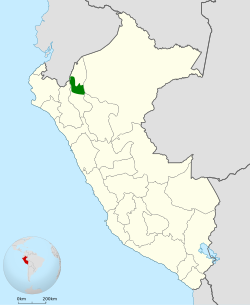| Orange-throated tanager | |
|---|---|
 | |
| Scientific classification | |
| Domain: | Eukaryota |
| Kingdom: | Animalia |
| Phylum: | Chordata |
| Class: | Aves |
| Order: | Passeriformes |
| Family: | Thraupidae |
| Genus: | Wetmorethraupis Lowery & O'Neill, 1964 |
| Species: | W. sterrhopteron |
| Binomial name | |
| Wetmorethraupis sterrhopteron Lowery & O'Neill, 1964 | |
 | |
The orange-throated tanager (Wetmorethraupis sterrhopteron) is a species of bird in the tanager family Thraupidae that is found very locally in humid forests around the Ecuador-Peru border. As a species it is considered threatened. The orange-throated tanager is the only member of the genus Wetmorethraupis, named after the ornithologist Alexander Wetmore. It is closely related to members of the genus Bangsia .
